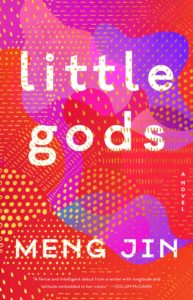A layered debut explores the big questions as theoretical physics, careers, class and gender collide.
Can we ever really know someone? Meng Jin’s debut novel LITTLE GODS attempts to answer that in an incredibly complex character study of Su Lan, a person who keeps reinventing herself across cities and continents.
The book opens against the backdrop of the Tiananmen Square demonstrations in 1989, where a maternity nurse, looking after Su Lan and her newborn, makes a pointed observation about the protesters: “Little gods, she thinks. Desperate to turn their own growing bodies, their own aches and despairs, into material that might reset the axes of worlds.” This urgency for change drives Su Lan through a book that combines theoretical physics, a mystery and a love story.
From the start we know that Su Lan only lived 17 ½ years beyond this opening. Jin steers us through her life via three separate but connected narrators. The first of these is Zhu Wen, an elderly neighbour cares for Su La’s daughter Liya in Shanghai. The second is Yongzong, a classmate of Su Lan who is still hung up on her years later. As the three top students in their class, he competed with fellow student Zhang Bo academically and for Su Lan’s affections. Finally, there’s Liya, who grew up in America but returns to China to search for her dad.
Each of the characters has their own ‘piece’ of Su Lan they are invested in and have constructed their own version of their story to various degrees. As such, it’s fair to treat each narrator as unreliable. Yet through them we begin to get a more complete picture of Su Lan prior to her death and how she dealt with the various expectations of each of them: as lover, as mother, as career academic. As a reader, I found my opinion of Su Lan shifting as each character unveiled more, revealing the weight of own assumptions.
Infused with a sense of place that you can almost touch, Jin uses these locations – primarily Beijing and Shanghai – to ground her exploration of some of the major themes: class, gender, motherhood and career. Yet if you find yourself judging some of Su Lan’s decisions, or start considering her to absenteeism a kind of callous indifference, ask yourself if you would feel the same about a career-minded father?
It’s Jin’s exploration of the nature of time and space being interconnected that leaves us with the most last impression. “Imagine two people starting at the same point in space-time, flying around this new sphere, in opposite directions,” she posits later in the novel after switching to an abstract third-person narration. “One travels in the direction of the future, the other in the direction of the past.” The idea that those people will eventually collide is a powerful one: we as readers have been asked to draw those intangible threads together to form that sphere in our minds.
Although specifically talking about the very Chinese American experience of otherness, Jin’s earnest but delicately constructed themes are universal. It’s still early in 2020, but LITTLE GODS is an early contender for those annual ‘best of’ lists we all love putting together.
2020 | US | WRITER: Meng Jin | PUBLISHER: Harper Collins Publishers| LENGTH: 280 pages | RELEASE DATE: 14 January 2020





